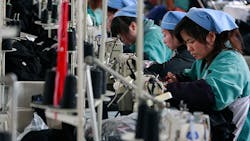Factories in China's Industrial Heartland Contracting, PMI Shows
Factories in China’s largest regional economy didn’t do well last month, raising questions about the resilience of the nation as it digs in for a prolonged trade battle with the U.S.
The manufacturing purchasing managers index for the southern Guangdong province dropped to 49.3 in August, according to the local government’s Economic & Information Commission. That’s the first time the gauge has dropped below the line of 50 -- which separates expansion and contraction -- since early 2016.
Guangdong, with an economy as large as Australia’s, is a major manufacturing hub and accounts for almost a third of China’s exports. It’s also home to some of the nation’s largest corporations including Tencent Holdings Ltd and Huawei Technologies Co.
The gauge shows both domestic pressure and "negative impact from rapidly changing international economic and political factors," the government agency said in a statement Monday. That’s in line with the declining trend of another private factory gauge and early indicators gathered by Bloomberg, while the official nationwide manufacturing PMI unexpectedly edged up in August.
The private Caixin gauge and Guangdong’s PMI both showed that "export-oriented companies have already been affected by the trade war, and this will spread to other coastal regions," said Bloomberg economist Qian Wan. Domestic policies such as boosting infrastructure and credit easing will underpin the economy, yet they won’t lift exporters as much, she said.
With tariffs already imposed on $50 billion Chinese exports, the U.S. may hit China with levies on another $200 billion goods as soon as this week.
"The difficulties for exporters will not turn around within in a few months, as the trade war looks set to only escalate further, " Wan said.
By Bloomberg News
About the Author
Bloomberg
Licensed content from Bloomberg, copyright 2016.
